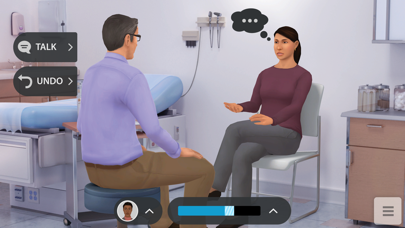
Talk About Opioids
The Talk About Opioids app is a clinical practice simulation in which you will learn and practice effective techniques to identify patients with Opioid Use Disorder (OUD) and discuss symptoms and appropriate treatment options. Lori, the virtual patient in this simulation, has been taking oxycodone for two years after sustaining a back injury and appears to be misusing her prescription. Your goal will be to to broach the subject of Loris opiate use, determine whether she fits the criteria for OUD and if so, try to motivate her to begin treatment, and decide on initial next steps.
Features:
Learn about symptoms of OUD and pharmacotherapies available to patients.
Learn collaborative communication techniques to discuss opioids and motivate patients to seek treatment when needed.
Practice discussing opioid use and appropriate treatment options in conversation with Lori, a virtual patient presenting with an OUD.
PCSS has partnered with Kognito to host a clinical practice simulation in which the user can earn CME/CNE credit.
About the Simulation:
Talk about Opioid Use Disorder with your patients: A clinical practice simulation is a 30-minute interactive case-based training simulation offering best practices and evidence-based communication strategies to better equip primary care providers to address the needs of patients with Opioid Use Disorder (OUD).
This simulation targets primary care clinicians, and will offer information about the opioid crisis, the neurobiology of OUD, the effectiveness of medication, and treating patients with OUD with empathy. The simulation is grounded in real-world experiences and will capture the participants decision points and performance; provide real-time feedback to participants on their decisions, errors, and missed steps; and proceed based on decisions by the participant during the simulation.
This simulation course was prepared with support through contract number Contract No. HHSS283201200002I/HHSS28342009T, Reference No. 283-12-0209 with the Substance Abuse and Mental Health Services Administration (SAMHSA), U.S. Department of Health and Human Services (HHS). Nothing in this simulation constitutes a direct or indirect endorsement by SAMSHA or HHS of any non-federal entitys products, services, or policies, and any reference to non-federal entitys products, services, or policies should not be construed as such.
